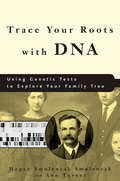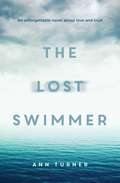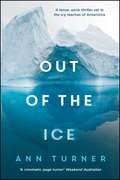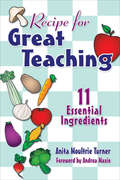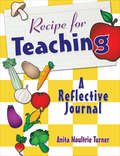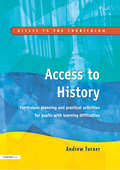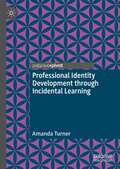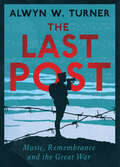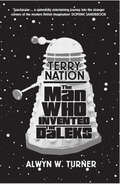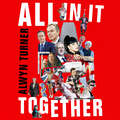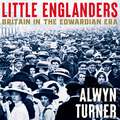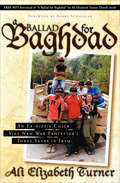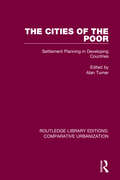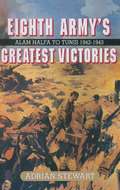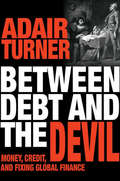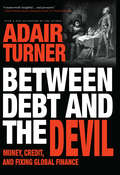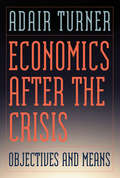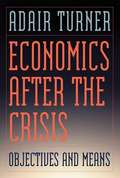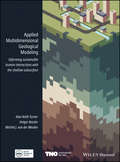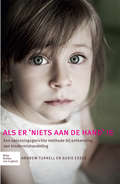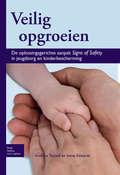- Table View
- List View
Trace Your Roots with DNA: Using Genetic Tests to Explore Your Family Tree
by Ann Turner Megan Smolenyak SmolenyakWritten by two of the country's top genealogists, Trace Your Roots with DNA is the first book to explain how new and groundbreaking genetic testing can help you research your ancestryAccording to American Demographics, 113 million Americans have begun to trace their roots, making genealogy the second most popular hobby in the country (after gardening). Enthusiasts clamor for new information from dozens of subscription-based websites, email newsletters, and magazines devoted to the subject. For these eager roots-seekers looking to take their searches to the next level, DNA testing is the answer. After a brief introduction to genealogy and genetics fundamentals, the authors explain the types of available testing, what kind of information the tests can provide, how to interpret the results, and how the tests work (it doesn't involve digging up your dead relatives). It's in expensive, easy to do, and the results are accurate: It's as simple as swabbing the inside of your cheek and popping a sample in the mail. Family lore has it that a branch of our family emigrated to Argentina and now I've found some people there with our name. Can testing tell us whether we're from the same family?My mother was adopted and doesn't know her ethnicity. Are there any tests available to help her learn about her heritage? I just discovered someone else with my highly unusual surname. How can we find out if we have a common ancestor? These are just a few of the types of genealogical scenarios readers can pursue. The authors reveal exactly what is possible-and what is not possible-with genetic testing. They include case studies of both famous historial mysteries and examples of ordinary folks whose exploration of genetic genealogy has enabled them to trace their roots.
The Lost Swimmer
by Ann TurnerAn unforgettable novel about love and trust Rebecca Wilding, an archaeology professor, makes sense of the past for a living. But suddenly, truth and certainty are turning against her. Rebecca is accused of serious fraud, and worse, she suspects - she knows - that her husband, Stephen, is having an affair. Desperate to find answers, Rebecca leaves with Stephen for Greece, Italy and Paris, where she can uncover the conspiracy against her, and hopefully win Stephen back to her side, where he belongs. There's too much at stake - her love, her family, her work. But on the idyllic Amalfi Coast, Stephen disappears. In a swirling daze of panic and fear, Rebecca is dealt with fresh allegations. And with time against her, she finds help in the most unlikely of places, and uncovers the secrets that stand between her and Stephen - and the deceit that has chased her halfway around the world. Sometimes marriage is a lonely place.
The Lost Swimmer: A haunting, razor-sharp thriller that explores the consequences of love and trust
by Ann TurnerSometimes a marriage can be a lonely place ... Rebecca Wilding, an archaeology professor, traces the past for a living. But suddenly, truth and certainty are turning against her. Rebecca is accused of serious fraud, and worse, she suspects - she knows - that her husband, Stephen, is having an affair. Desperate to find answers, Rebecca leaves with Stephen for Greece, Italy and Paris, where she can uncover the conspiracy against her, and hopefully win Stephen back to her side, where he belongs. There's too much at stake - her love, her work, her family. But on the idyllic Amalfi Coast, Stephen goes swimming and doesn't come back. In a swirling daze of panic and fear, Rebecca is dealt with fresh allegations. And with time against her, she must uncover the dark secrets that stand between her and Stephen, and the deceit that has chased her halfway around the world.
Out of the Ice
by Ann TurnerBy the bestselling author of The Lost Swimmer, a tense, eerie thriller set in the icy reaches of Antarctica When environmental scientist Laura Alvarado is sent to a remote Antarctic island to report on an abandoned whaling station, she begins to uncover more than she could ever imagine. Reminders of the bloody, violent past are everywhere, and Laura is disturbed by evidence of recent human interference. Rules have been broken, and the protected wildlife is behaving strangely. On a diving expedition, Laura emerges into an ice cave where she is shocked to see an anguished figure, crying for help. But in this freezing, lonely landscape there are ghosts everywhere, and Laura wonders if her own eyes can be trusted. Has she been in the ice too long? Back at base, Laura's questions about the whaling station go unanswered, blocked by scientists unused to outsiders. And Laura just can't shake what happened in the cave. Piecing together a past and present of cruelty and vulnerability that can be traced around the world, from Norway, to Nantucket, Europe and Antarctica, Laura will stop at nothing to unearth the truth. As she comes face to face with the dark side of human progress, she also discovers a legacy of love, hope and the meaning of family. If only Laura can find her way . . . Out of the ice. Praise for The Lost Swimmer 'A vivid, suspenseful thriller' Sydney Morning Herald 'Reminiscent of Patricia Highsmith's The Talented Mr Ripley ... In the best thriller traditions, this exciting novel's end-game contains an unexpected twist.' The Age 'An expertly scripted psychological thriller ... An evocative, absorbing and tense tale of trust and betrayal.' Australian Book Review 'The definition of a page-turner.' Marie Claire 'A smartly constructed, tense thriller that will leave you guessing until the very end. It's a remarkable debut from former filmmaker Ann Turner, who's destined to become a prominent name in Australian writing.' Better Reading
Out of the Ice
by Ann Turner***FROM THE ACCLAIMED AUTHOR OF THE LOST SWIMMER, now in development as a film*** 'A taut and tightly wound page-turner' Marie Claire When environmental scientist Laura Alvarado is sent to a remote Antarctic island to report on an abandoned whaling station, she begins to uncover more than she could ever imagine. On a diving expedition, Laura emerges into an ice cave where she is shocked to see an anguished figure, crying for help. But in this freezing, lonely landscape there are ghosts everywhere, and Laura wonders if her own eyes can be trusted. Has she been in the ice too long? Piecing together a past and present of cruelty and vulnerability that can be traced around the world, from Norway, to Nantucket, Europe and Antarctica, Laura will stop at nothing to unearth the truth. As she comes face to face with the dark side of human progress, she also discovers a legacy of love, hope and the meaning of family. If only Laura can now find her way out of the ice ...Out of the Ice delivers compelling psychological drama for fans of Ruth Ware and Rosamund Lupton. Praise for The Lost Swimmer, now being developed as a film: ‘Ann Turner has produced a vivid, suspenseful thriller that should appeal to those with a taste for armchair travel’ Sydney Morning Herald ‘We had pins and needles trying to unravel the truth throughout Turner’s crisply written, cleverly plotted tale of deceit’ iBooks Editor
Recipe for Great Teaching: 11 Essential Ingredients
by Anita Moultrie TurnerNew teachers, experienced teachers, and staff developers can use this well-seasoned recipe to blend the essential ingredients of effective and productive classrooms where all students can succeed.
Recipe for Great Teaching: 11 Essential Ingredients
by Anita Moultrie TurnerIn this well-seasoned book, charismatic educator Anita Moultrie Turner shows new teachers, veteran teachers, and staff developers how to blend 11 essential ingredients into effective and productive classrooms where all students can succeed. Easy to read and hard to put down, this Recipe for Great Teaching features: - Classroom stories, quotations, and tasty servings of educational wit and wisdom - Strategies for building effective learning environments - Techniques for successful curriculum planning - Methods for engaging all students in learning - Ways of working with colleagues and the community This inspiring resource offers enticing and delicious ways to spice up your teaching and your students' learning.
Recipe for Teaching: A Reflective Journal
by Anita Moultrie TurnerIdeal as a standalone or as a companion to the book Recipe for Great Teaching, this journal offers "savory morsels" of educational wisdom and opportunities to reflect on your practice.
Food Education and Food Technology in School Curricula: International Perspectives (Contemporary Issues in Technology Education)
by Angela Turner Marion RutlandThis book draws together the perceptions and experiences from a range of international professionals with specific reference to food education. It presents a variety of teaching, learning and curriculum design approaches relating to food across primary, secondary and vocational school education, undergraduate initial teacher education programs, and in-service professional development support contexts. Contributions from authors of a variety of background and countries offer insight into some of the diverse issues in food education internationally, lessons to be learned from successes and failures, including action points for the future. The book will be both scholarly and useful to teachers in primary and secondary schools.
Access to History: Curriculum Planning and Practical Activities for Children with Learning Difficulties (Access To The Curriculum Ser.)
by Andrew TurnerThis accessible and practical teaching resource focuses on access to the history curriculum for pupils with learning difficulties. Within an inclusive framework of participation and achievement for all, the book provides activities designed to be accessible to pupils with diverse individual needs, guidance on the P levels, assessment and recording opportunities, and advice on teaching history in a cross-curricular way. By keeping in mind the needs of the busy practitioner, the book avoids jargon and concentrates on the real teaching opportunities.
Professional Identity Development through Incidental Learning
by Amanda TurnerSince the early 1990s there has been a persistent drive towards professionalising the education sector, with a particular focus on those responsible for teaching the post-fourteen age group. This shift towards recognition of the sector in terms of the professionals who teach within it has led to constant, repetitive revision of teaching standards, the regulation and subsequent de-regulation of the teaching qualifications and the introduction of professional bodies. This book aims to explore the way that professional identity develops for trainee teachers, in the FE and Skills sector, with a particular emphasis on the role that incidental learning has in this development. The author argues for a more holistic approach to the development of professionalism through these informal learning experiences, as opposed to a criteria based approach.
The Last Post: Music, Remembrance and the Great War
by Alwyn W. TurnerA history of the military bugle call, its use at the end of World War I on Armistice Day, and its effect in today’s culture.At eleven o’clock on the morning of the 11th November 1919 the entire British Empire came to a halt to remember the dead of the Great War. During that first two-minute silence all transport stayed still, all work ceased and millions stood motionless in the streets. The only human sound to be heard was the desolate weeping of those overcome by grief. Then the moment was brought to an end by the playing of the Last Post.A century on, that lone bugle call remains the most emotionally charged piece of music in public life. In an increasingly secular society, it is the closest thing we have to a sacred anthem. Yet along with the poppy, the Cenotaph and the tomb of the Unknown Warrior, its power is profoundly modern. It is a response to the trauma of war that could only have evolved in a democratic age.In this moving exploration of the Last Post’s history, Alwyn W. Turner considers the call’s humble origins and shows how its mournful simplicity reached beyond class, beyond religion, beyond patriotism to speak directly to peoples around the world. Along the way he contemplates the relationship between history and remembrance, and seeks out the legacy of the First World War in today’s culture.
Terry Nation: The Man Who Invented the Daleks
by Alwyn W. TurnerA “splendidly entertaining” biography of the British tv writer acclaimed for his invention of a fictional alien race for Doctor Who (Dominic Sandrook, author of State of Emergency—The Way We Were: Britain 1970–1974).The Daleks are one of the most iconic and fearsome creations in television history. Since their first appearance in 1963, they have simultaneously fascinated and terrified generations of children, their instant success ensuring, and sometimes eclipsing, that of Doctor Who. They sprang from the imagination of Terry Nation, a failed stand-up comic who became one of the most prolific writers for television that Britain ever produced. Survivors, his vision of a post-apocalyptic England, so haunted audiences in the Seventies that the BBC revived it over thirty years on, and Blake’s 7, constantly rumored for return, endures as a cult sci-fi classic. But it is for his genocidal pepperpots that Nation is most often remembered, and now, more than 50 years after their creation they continue to top the Saturday-night ratings. Yet while the Daleks brought him notoriety and riches, Nation played a much wider role in British broadcasting’s golden age. He wrote for Spike Milligan, Frankie Howerd and an increasingly troubled Tony Hancock, and as one of the key figures behind the adventure series of the Sixties—including The Avengers, The Saint and The Persuaders!—he turned the pulp classics of his boyhood into a major British export. In The Man Who Invented the Daleks, acclaimed cultural historian Alwyn W. Turner, explores the curious and contested origins of Doctor Who’s greatest villains, and sheds light on a strange world of ambitious young writers, producers and performers without whom British culture today would look very different.
All In It Together: England in the Early 21st Century
by Alwyn TurnerThe headlines may be all Covid now, as a few short months ago they were all Brexit, but breakdown of the UK's political sphere has been a long time coming, and it is a symptom of a much deeper malaise. We seem to have lost our faith in all our social institutions, from parliament and the press to banking and religion. It is this wider disillusionment that All in It Together, a cultural, political and social history of Britain from 2000 to 2015, explains.But this is no po-faced recounting of the last two decades. Drawing on both high politics and low culture, Alwyn Turner takes us from Downing Street to Benefits Street as he tells the defining story of contemporary Britain. The book takes in key issues such as immigration and the Scottish independence referendum, but also finds room forgrime, Grindr and the smoking ban. Brilliantly researched, intellectually stimulating and hugely entertaining, All in It Together will be required reading for years to come.
Little Englanders: Britain in the Edwardian Era
by Alwyn TurnerA queen's death and a king's coronation. Rising mass media and declining public morals. Splits in all the major political parties and a new wave of social activism. War abroad and strikes at home. Welcome to Edwardian England.When Queen Victoria died in 1901 it was the end of an era. Britain's dominance stretched across seven continents and its ruling classes were wealthier than ever before. Many later remembered the decade or so that followed as the long afternoon of an empire where the sun never set. Yet the Edwardians themselves were acutely aware that the country was in a state of flux; the seismic change that they felt would transform modern Britain forever.In Little Englanders, Alwyn Turner reconsiders the Edwardian era as a time of profound social change, with the rise of women's suffrage and the labour movement, unrest in Ireland and the Boer republics, scandals in parliament and culture wars at home. He tells the story of the Edwardians through music halls and male beauty contests, the real Peaky Blinders and the 1908 Summer Olympics, and Marie Lloyd, Arthur Conan Doyle and Winston Churchill. In this colourful, detailed and hugely entertaining social history, Turner shows that, though the golden Victorian age was in the past, the birth of modern Britain was only just beginning.
Ballad for Baghdad: An Ex-Hippie Chick Viet Nam War Protester's Three Years in Iraq
by Ali Elizabeth Turner Bobby SchindlerHow did an ex-hippie chick Viet Nam War protester become a fierce soldier supporter, living in a combat zone in an increasingly unpopular war? From 2004 to 2007, Ali Elizabeth Turner had the chance of a lifetime to learn firsthand that freedom isn't free and to say a much belated thank you for her freedom by working in Morale, Welfare, and Recreation centers in Baghdad. She heard the stories of hundreds of Iraqis, Coalition soldiers, interpreters, Navy SEALS, Army Rangers, and contractors from around the world. She was in Baghdad for the return of Iraq to the Iraqis, Saddam's ongoing antics in court, all three Iraqi elections, and Saddam's trial and execution. No matter what you think of Operation Iraqi Freedom, you deserve to hear the stories that go beyond the politics--stories of courage, compassion, miracles, and humor. Read and see if you don't end up singing the Ballad!
The Cities of the Poor: Settlement Planning in Developing Countries
by Alan TurnerOriginally published in 1980, this book was written by consultants in urban development with wide experience in the developing world and is a source book aimed at advisers (often from developed countries) who assist with urban planning matters on behalf of multi-lateral agencies such as the World Bank. It presents a style of consultancy which accepts that not all the problems of settlement planning in developing countries can be solved by the transfer of Western methods. Although the book concentrates on the techniques and methods which have been found to be effective in the field, it also argues for a new philosophy of consultancy, in which consultants work with local staff and using the ingenuity and spirit of enterprise among the communities themselves.
Eighth Army's Greatest Victories: Alam Halfa to Tunis 1942–1943
by Adrian TurnerTo read many accounts, it would appear that the Eighth Army's victory at El Alamein was quickly followed by its triumphant arrival at Tunis. Adrian Turner, the experienced authority on the period, redresses the imbalance by describing brilliantly the progress of this legendary fighting force and describing the ferocity of such battles as that for the Mareth Line. The author deftly handles strategic level thinking, the tactical battles and individual contributions. Aviation readers will be thrilled by recognition of the Desert Air Force's contribution, too often neglected.
Between Debt and the Devil
by Adair TurnerAdair Turner became chairman of Britain's Financial Services Authority just as the global financial crisis struck in 2008, and he played a leading role in redesigning global financial regulation. In this eye-opening book, he sets the record straight about what really caused the crisis. It didn't happen because banks are too big to fail--our addiction to private debt is to blame.Between Debt and the Devil challenges the belief that we need credit growth to fuel economic growth, and that rising debt is okay as long as inflation remains low. In fact, most credit is not needed for economic growth--but it drives real estate booms and busts and leads to financial crisis and depression. Turner explains why public policy needs to manage the growth and allocation of credit creation, and why debt needs to be taxed as a form of economic pollution. Banks need far more capital, real estate lending must be restricted, and we need to tackle inequality and mitigate the relentless rise of real estate prices. Turner also debunks the big myth about fiat money--the erroneous notion that printing money will lead to harmful inflation. To escape the mess created by past policy errors, we sometimes need to monetize government debt and finance fiscal deficits with central-bank money.Between Debt and the Devil shows why we need to reject the assumptions that private credit is essential to growth and fiat money is inevitably dangerous. Each has its advantages, and each creates risks that public policy must consciously balance.
Between Debt and the Devil: Money, Credit, and Fixing Global Finance
by Adair TurnerAdair Turner became chairman of Britain's Financial Services Authority just as the global financial crisis struck in 2008, and he played a leading role in redesigning global financial regulation. In this eye-opening book, he sets the record straight about what really caused the crisis. It didn’t happen because banks are too big to fail—our addiction to private debt is to blame.Between Debt and the Devil challenges the belief that we need credit growth to fuel economic growth, and that rising debt is okay as long as inflation remains low. In fact, most credit is not needed for economic growth—but it drives real estate booms and busts and leads to financial crisis and depression. Turner explains why public policy needs to manage the growth and allocation of credit creation, and why debt needs to be taxed as a form of economic pollution. Banks need far more capital, real estate lending must be restricted, and we need to tackle inequality and mitigate the relentless rise of real estate prices. Turner also debunks the big myth about fiat money—the erroneous notion that printing money will lead to harmful inflation. To escape the mess created by past policy errors, we sometimes need to monetize government debt and finance fiscal deficits with central-bank money.Between Debt and the Devil shows why we need to reject the assumptions that private credit is essential to growth and fiat money is inevitably dangerous. Each has its advantages, and each creates risks that public policy must consciously balance.
Economics After the Crisis: Objectives and Means (Lionel Robbins Lectures)
by Adair TurnerA noted economist challenges the fundamental economic assumptions that cast economic growth as the objective and markets as the universally applicable means of achieving it. The global economic crisis of 2008–2009 seemed a crisis not just of economic performance but also of the system's underlying political ideology and economic theory. But a second Great Depression was averted, and the radical shift to New Deal-like economic policies predicted by some never took place. Perhaps the correct response to the crisis is simply careful management of the macroeconomic challenges as we recover, combined with reform of financial regulation to prevent a recurrence. In Economics After the Crisis, Adair Turner offers a strong counterargument to this somewhat complacent view. The crisis of 2008–2009, he writes, should prompt a wide set of challenges to economic and political assumptions and to economic theory. Turner argues that more rapid growth should not be the overriding objective for rich developed countries, that inequality should concern us, that the pre-crisis confidence in financial markets as the means of pursuing objectives was profoundly misplaced.
Economics After the Crisis
by Adair TurnerThe global economic crisis of 2008--2009 seemed a crisis not just of economic performance but also of the system's underlying political ideology and economic theory. But a second Great Depression was averted, and the radical shift to New Deal-like economic policies predicted by some never took place. Perhaps the correct response to the crisis is simply careful management of the macroeconomic challenges as we recover, combined with reform of financial regulation to prevent a recurrence. In Economics After the Crisis, Adair Turner offers a strong counterargument to this somewhat complacent view. The crisis of 2008--2009, he writes, should prompt a wide set of challenges to economic and political assumptions and to economic theory. Turner argues that the faults of theory and policy that led to the crisis were integral elements within a broader set of simplistic beliefs about the objectives and means of economic activity that dominated policy thinking for several decades. This dominant discourse cast economic growth as the objective, markets as the universally applicable means of achieving it, and inequality as inevitable and necessary. Turner takes on these assumptions point by point, arguing that more rapid growth should not be the overriding objective for rich developed countries, that inequality should concern us, that the pre-crisis confidence in financial markets as the means of pursuing objectives was profoundly misplaced, and that these conclusions have broad implications for the case for economic freedom, for specific areas of public policy (including financial regulation and climate change), and for the discipline of economics itself.
Applied Multidimensional Geological Modeling: Informing Sustainable Human Interactions with the Shallow Subsurface
by A. Keith TurnerOver the past decades, geological survey organizations have digitized their data handling and holdings, unlocking vast amounts of data and information for computer processing. They have undertaken 3-D modeling alongside, and in some cases instead of, conventional geological mapping and begun delivering both data and interpretations to increasingly diverse stakeholder communities. Applied Multidimensional Geological Modeling provides a citable central source that documents the current capabilities and contributions of leading geological survey organization and other practitioners in industry and academia that are producing multidimensional geological models. This book focuses on applications related to human interactions with conditions in the shallow subsurface, within 100-200 m of the surface. The 26 chapters, developed by 100 contributors associated with 37 organizations, discuss topics relevant to any geologist, scientist, engineer, urban planner, or decision maker whose practice includes assessment or planning of underground space.
Als er 'niets aan de hand' is: Een oplossingsgerichte methode bij ontkenning van kindermishandeling
by Andrew Turnell S. E. Essex Techn. CollegeDe schrijvers van 'Als er 'niets aan de hand' is' hebben ook in ons land veel succes met hun methode 'Veilig opgroeien' (oorspronkelijke titel: 'Signs of Safety'). In dit tweede boek laten zij zien dat er een weg is uit het ontkenningsdilemma. Iedere hulpverlener in de jeugdzorg kent het probleem van ontkenning bij ernstige aanwijzingen voor kindermishandeling of seksueel misbruik in gezinnen. Ouders die, geconfronteerd met vermoedens van mishandeling, iedere verdenking van de hand wijzen. In de praktijk leidt dit vaak tot een vruchteloos meningsverschil tussen gezin en hulpverleners, gevolgd door uithuisplaatsing van het kind en uiteen vallen van het gezin. Een uit nood geboren situatie die geen van de betrokkenen eigenlijk wenst. Het is echter mogelijk gezinnen op een verantwoorde manier bij elkaar te houden of te herenigen. De discussie over wie precies wat gedaan heeft, maakt plaats voor de vraag: hoe kunnen we voortaan zorgen dat de kinderen in het gezin veilig zijn. De achterliggende gedachte - de aandacht vooral op de toekomst richten - lijkt simpel, maar betekent in de praktijk hard werken, zo stellen de auteurs. Ze illustreren dit aan de hand van vele uit het leven gegrepen voorbeelden en geven, stap-voor-stap, een concrete leidraad hoe dit in de praktijk gebracht kan worden. Zo laten zij overtuigend zien dat de Signs of Safety-benadering rond ontkenningszaken ook een dankbare ervaring is. Gezinnen en hun netwerk gaan aan de slag met een eigen, op maat gemaakt veiligheidsplan, haast altijd met succes. Dit boek is bedoeld voor hulpverleners van Jeugdzorg en de Kinderbescherming en kwam tot stand op initiatief van TNO Kwaliteit van leven en met een bijdrage van Stichting Kinderpostzegels Nederland.
Veilig opgroeien
by Andrew Turnell Steve EdwardsIn Veilig opgroeien (oorspronkelijke titel Signs of Safety), wordt een nieuwe benadering in de bescherming van kinderen gepresenteerd. Hulpverleners in de jeugdzorg en kinderbescherming kunnen hiermee potentieel risicovolle situaties beoordelen en vinden hierin praktische hands-on strategieën voor het opbouwen van een samenwerkingrelatie met de ouders. Uit de praktijk blijkt dat dit op de lange termijn kindermishandeling en uit huis plaatsing kan voorkomen. Er zijn weinig beroepsgroepen waarbij emotie zo'n grote rol speelt als bij hulpverleners in de jeugdzorg en de kinderbescherming. Logisch; het gaat immers om kwetsbare kinderen die bedreigd worden in hun ontwikkeling, of erger. Daarom heeft ook iedereen een oordeel over het werk van deze hulpverleners. Zij liggen vaak onder vuur: omdat ze wél ingrijpen of omdat ze níet ingrijpen. Het gevolg is dat hulpverleners steeds vaker risicomijdend gedrag vertonen - het beruchte Savanna-effect - dat tot meer uithuisplaatsingen van kinderen leidt. De auteurs van Veilig opgroeien bieden een beter alternatief. Zij hebben in de praktijk vastgesteld dat samenwerking met het gezin de beste resultaten oplevert. In negen hoofdstukken worden zowel het theoretische kader als de praktijkelementen van Signs of Safety uitgebreid behandeld. Dit praktijkboek laat zien hoe je deze benadering steeds kunt toepassen: van intake via onderzoek en beoordeling tot afsluiting van het dossier.
